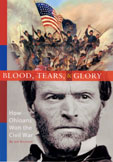
“A Second Great Army”
As the feisty Col. William B. Hazen’s 41st Ohio prepares to leave Ohio for Kentucky, thousands of other Ohioans stay home but fight for the Union in their own way. They are the women of Ohio (right). Many are the mothers, wives, sisters, and sweethearts of the soldiers, but others are simply patriotic women who want to do their part.
And their part is an important one. Especially in the early months of the war, soldiers often lack even the basics in medical supplies, clothing and bedding, and food. This is especially true of the Western armies, which often dangle, poorly supplied, at the end of long, cumbersome supply lines. It is likely that some battles will not be won for the Union—let alone fought—without the support services of volunteer women.
As soon as the war broke out, women in cities, towns and villages across Ohio began meeting in farmhouse kitchens and church basements to roll bandages, knit socks, and can food. The Cleveland Soldiers’ Aid Society, possibly the first of its kind in the nation, sprang into existence within a week of Fort Sumter’s surrender. One of the Cleveland women’s first campaigns was a “blanket raid” (as they called it) during which they went cold-calling door to door throughout the city. In two days they collected a thousand donated blankets to give to a regiment of raw recruits who arrived in camp with only the clothes on their backs.
The Soldiers’ Aid Societies in Cleveland, Columbus, and Cincinnati morphed into three of the ten major branches of the United States Sanitary Commission, an early version of the Red Cross. [The name derives from the agency’s goal of reducing disease among soldiers by cleaning up their camps. Granted official standing by the Union government, “The Sanitary,” as it is nicknamed, provides a wide array of support services. Much of the labor is supplied by women.]
Across Ohio, hundreds of smaller aid societies in towns and villages channel the work of their hands to the main branches, which forward them to the western armies. Some women volunteer to do nursing in military hospitals both inside and outside the state. The work the women do is so important that a government official termed them “a second great army…working scarcely less earnestly and efficiently for the same great end” as the soldiers.
>>>In Boston, the local grandees throw a banquet in honor of Capt. Charles Wilkes, who commands the San Jacinto, the Navy vessel that stopped the British mail steamer Trent and removed Confederate envoys Mason and Slidell. That made Wilkes a national hero, but already members of the Lincoln administration are fretting about the potential for British anger. In Wheeling, delegates from throughout western Virginia begin meeting to write a constitution, part of an effort to win statehood from the Union government. Meanwhile, at two points in eastern Virginia, Union and Confederate troops skirmish, with Pennsylvania cavalrymen taking a few casualties. Another skirmish occurs near independence, Missouri, with no casualties reported.
Your suggestions, comments, and questions are always welcome. Address the author: Ohioan@bloodtearsandglory.com
For more information about the author’s book, go to http://www.orangefrazer.com/btg




No comments:
Post a Comment